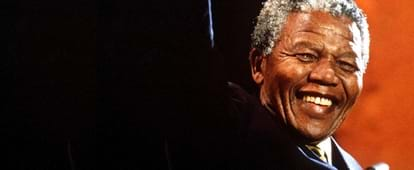By creating an account, I agree to the
Terms of service and Privacy policy
Choose your country and language:
Africa
Americas
Asia Pacific
Europe
IIt is hard to pay tribute to Nelson Rolihlahla Mandela, the man who led South Africa out of apartheid into democracy and for whom the accolades have rolled in from practically every corner of the earth. With his passing, he will be remembered for his generosity of spirit and the remarkable achievement of bringing peace to a deeply divided country.
FFormer South African president, Rolihlahla Mandela, was born on 18 July 1918 in a small village in the Transkei called Mvezo. Later he was sent to school in the small town of Qunu where a teacher gave him the name 'Nelson'.
Although of royal lineage, Mandela was the only member of his family to receive formal education, and so, from a very young age, he started to unwittingly prepare himself for the great task that lay ahead.
IIn 1939, he enrolled at Fort Hare (the only black university in South Africa at the time) where he forged lifelong friendships with many of those who fought the struggle for freedom with him. He was expelled from university a year later for his political activities but later completed his studies through UNISA.
From 1942 onwards he became increasingly active within the African National Congress whilst working as an apprentice at a legal firm in Johannesburg and furthering his studies. He later started the first black legal firm, Mandela and Tambo, with friend and fellow activist Oliver Tambo in 1952.
During this time, Mandela's natural authority and strategic mind saw him start to emerge as one of the party's leaders and a proponent of the armed struggle, a role that led to several arrests and brushes with the law during the 1950s Defiance Campaign.

BBut Mandela's luck finally ran out on August 5 in 1962 when he was arrested outside the town of Howick in KwaZulu-Natal, disguised as a chauffeur, after having paid a secret visit to ANC President Chief Albert Luthuli who was living in Groutville under house arrest.
Mandela had been on the run for 17 months and had just returned from a trip through Africa where he had received military training and to London where he went to seek support for the ANC.
This arrest was the start of what was to become a 27-year incarceration during which he would become the most famous political prisoner in the world and emerge as the future president of South Africa.
Initially, he was sentenced for five years for leaving the country illegally and incitement but then came the Rivonia Trial during which he was sentenced to life, starting his incarceration on Robben Island on June 13 in 1964.
At the closing of the Rivonia trial, Nelson Mandela uttered these famous words on behalf of his co-accused: "During my lifetime I have dedicated myself to this struggle of the African people. I have fought against white domination, and I have fought against black domination. I have cherished the ideal of a democratic and free society in which all persons live together in harmony and with equal opportunities. It is an ideal which I hope to live for and to achieve. But if needs be, it is an ideal for which I am prepared to die."

AAnd when he emerged from prison in 1990, his most remarkable feat was that he was able to lead the country without bitterness about the past whilst living out his ideal of creating a non-racial country where everybody was treated with the same dignity.
And that is why, decades after South Africa's first democratic election, and even after his death, every South African and every freedom lover around the world will continue to hold Nelson Mandela, or Madiba (his clan name), in the highest regard.
Related Articles

